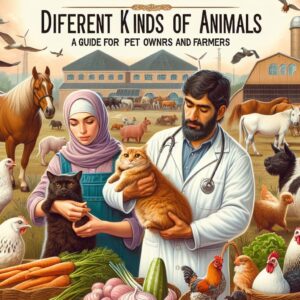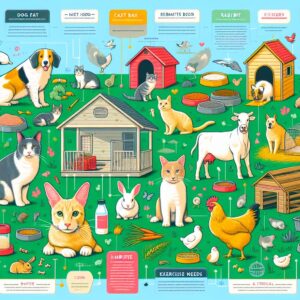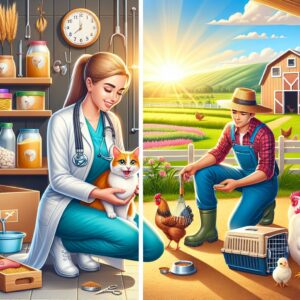Introduction
As pet owners or farmers, it is our responsibility to provide proper care and attention to the animals that depend on us. Whether you have a furry friend at home or manage a livestock farm, understanding the needs of different animals is crucial for their well-being. In this article, we will explore some key considerations for caring for various types of animals and offer guidance on ensuring their health and safety.
Pet Owners: Providing the Best Care for Your Furry Friends
Owning a pet brings immense joy and companionship, but it also comes with several responsibilities. Here are a few important aspects to consider for different kinds of pets:
-
Dogs: Dogs are known for their loyalty and energy. Regular exercise, a balanced diet, and vaccination are fundamental for maintaining their overall health. Dogs also need socialization and mental stimulation, so make sure to spend quality time with them.
-
Cats: Feline friends require a healthy diet, plenty of water, and regular visits to the veterinarian. Cats are naturally clean animals, so providing a clean litter box is crucial. Additionally, scratching posts and toys can help satisfy their instinctual needs and prevent furniture damage.
-
Birds: Birds require specific care depending on the species. A balanced diet, a clean and spacious cage, appropriate perches, and regular companionship are key to their well-being. Regular vet check-ups are also essential for their health.
-
Fish: Fish care involves maintaining a suitable tank environment with proper filtration and temperature control. A well-balanced diet that meets their specific nutritional needs is essential. Regular water tests, cleaning, and avoiding overstocking will aid in keeping the fish healthy and thriving.
Farmers: Proper Care for Livestock and Farm Animals
Farmers play a crucial role in providing us with food and other resources. Taking the best care of livestock and farm animals is not only ethically important but also vital for their productivity. Here are some valuable tips:
-
Cattle: Ensuring access to clean water, nutritious feed, and adequate space for movement is crucial for cattle. Regular health check-ups, vaccination, and appropriate shelter are necessary for maintaining their well-being. Furthermore, proper waste management is vital in preventing the spread of diseases.
-
Poultry: Poultry care involves providing a clean and appropriate environment that allows natural behavior and minimizes stress. Regular feeding, access to fresh water, and appropriate lighting are important considerations. Implementing biosecurity measures is essential for preventing the spread of diseases.
-
Sheep and Goats: These animals require adequate grazing land, good-quality forage, and proper fencing to prevent escape or predation. Regular vaccinations, deworming, and hoof care are critical for their health. Providing shelter during extreme weather conditions is also necessary.
-
Swine: Proper housing, a nutritious diet, and access to clean water are essential for the well-being of pigs. Regular health checks, vaccinations, and effective waste management are vital for disease prevention. Maintaining appropriate temperatures in the pigsty is crucial for their comfort.
Caring for Injured Animals in the Wild
While it is important to prioritize the well-being of our pets and farm animals, we must also be mindful of injured animals in the wild. If you come across an injured animal, it is crucial to take the following steps:
-
Assess the situation: Ensure your safety and observe the animal from a safe distance. Determine if professional assistance is required or if the animal will recover on its own.
-
Contact local wildlife rescue organizations or veterinarians who specialize in wildlife care. They will guide you on the appropriate action to take.
-
Exercise caution: If you must handle the injured animal, wear protective gloves and follow instructions carefully. Remember, wild animals are unpredictable and can become aggressive when injured or scared.
Conclusion
Caring for different kinds of animals requires a deep understanding of their specific needs and behaviors. As responsible pet owners and farmers, it is our duty to provide proper nutrition, shelter, medical care, and a safe environment for the animals in our care. Additionally, being aware of appropriate steps to take when encountering injured animals in the wild is crucial for their well-being. By following these guidelines, we can ensure that the animals we care for lead healthy and fulfilling lives.



